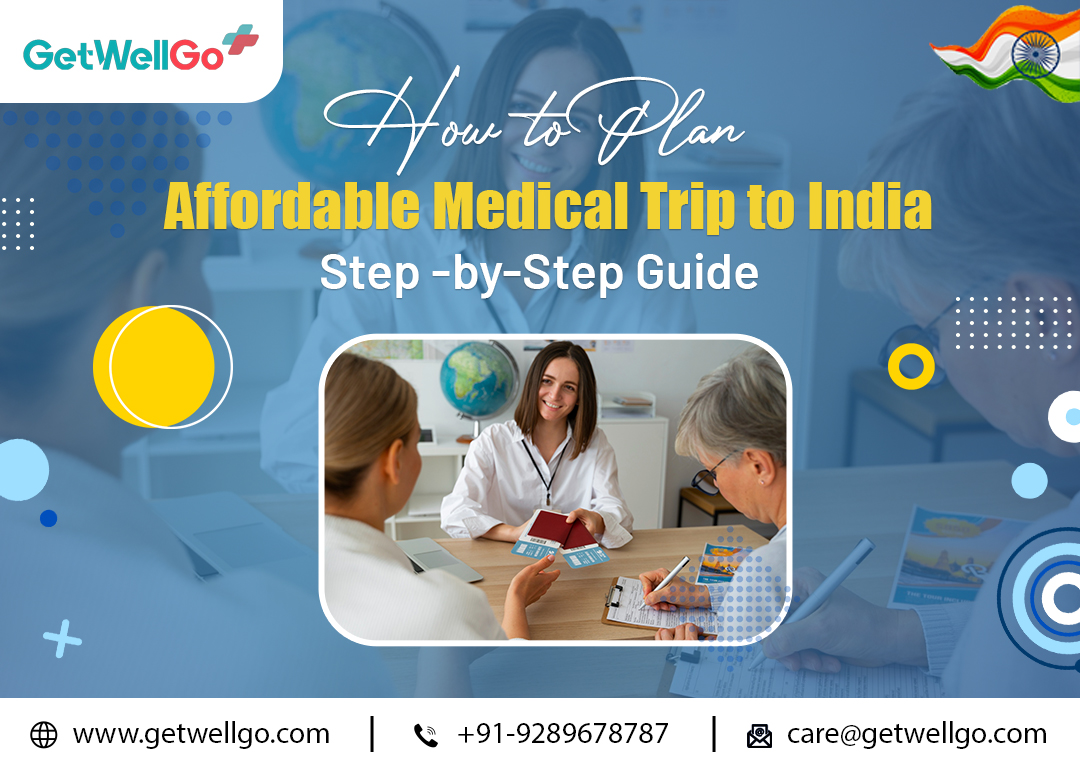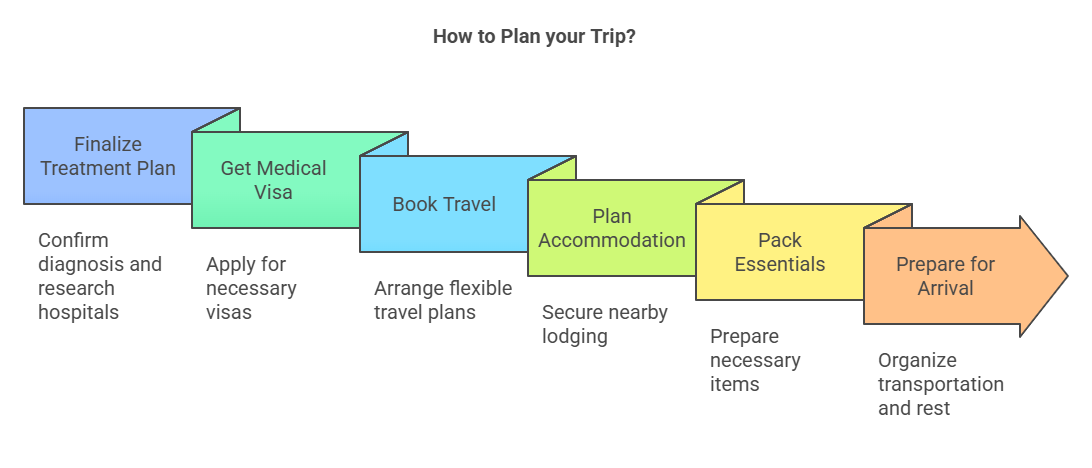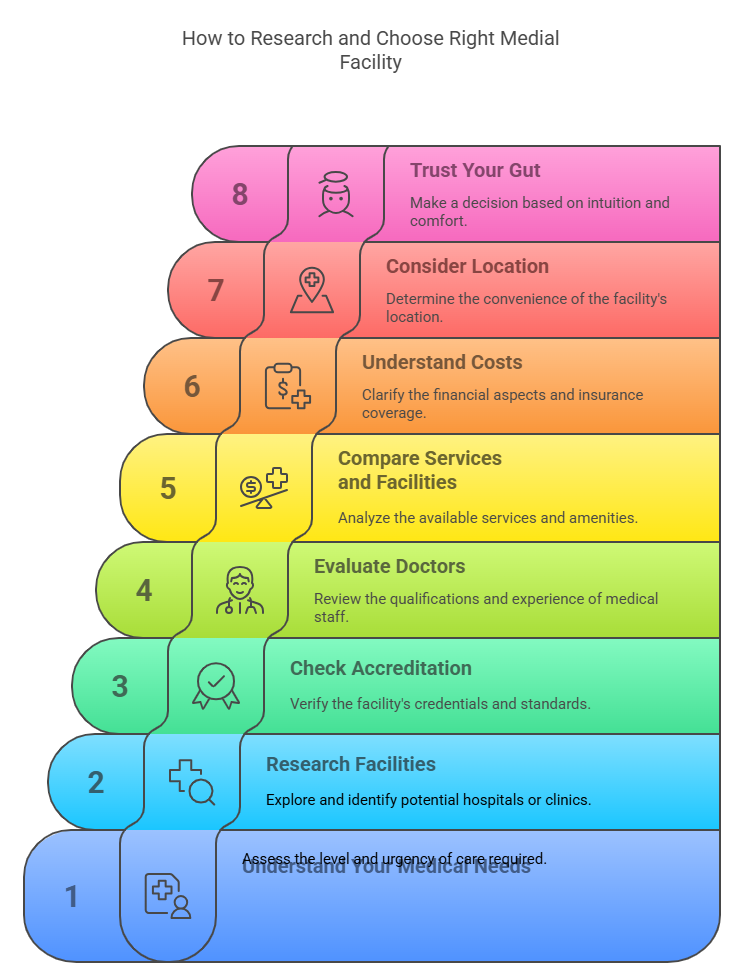How to Plan Affordable Medical Trip to India - Step -by-Step Guide
Discover how to plan an affordable medical trip to India with GetWellGo. Step-by-step guide for international patients seeking quality healthcare abroad.

-
Category
General -
Published By
GetWellGo Team -
Updated on
10-Apr-2025
How to Research and Choose Right Medial Facility
Understand Your Medical Needs
- Level of care: Do you need an operation, tests, treatment over a week, specialized treatment such as cancer, heart, fertility?
- Urgency: Is it an elective procedure (planned) or an emergency?
Research Facilities
- Search Online: As you want to find the top hospitals or clinics of your preference.
Check Accreditation:
- For example, JCI (Joint Commission International) for international hospitals.
- NABH (National Accreditation Board for Hospitals) in India.
Check Doctor’s Credentials
- Education: Search for the degrees, fellowships and board certification etc.
- Experience: This is particularly when it comes to surgeries and other complicated procedures.
- Success Rates: Some of the facilities provide this for particular service offerings.
Compare Services and Facilities
- Availability of ICU, technological equipments, exclusive rooms.
- Special Services: 24/7 emergency, international patient support, translators, visa help.
- Second Opinions: Some of the hospitals in this world allow free second opinion through the internet.
Understand Costs
- Quotes: As many other hospitals, we also have various estimated packages.
- Insurance: Insurance related to the centre should be checked to see whether your insurance covers the facility or not.
- Options: Examine what is included (consult, surgery, accommodation) and what is not included (drugs, tests).
Check Location and Travel Ease
- Proximity: To airport, hotels transport.
- Travel and accommodation arrangements and translating services: Most large hospitals provide separate services dealing with issues to do with travel, accommodation, and translating.
Ask Questions Directly
Prepare a list:
- You see, I wanted to know the number of similar cases that you have worked on in the past.
- What are the expectations of the expected results and the drawbacks of the process?
- How long is the recovery?
- What kind of additional care is offered after the treatment (rehabilitation, counselling/consultation)?
If possible go in person (otherwise do a Virtual Tour).
- Some of the offers include virtual tour through the internet.
- It also makes you to speak to other patients through forums or even the hospital’s recommendation.
Trust Your Gut
- In addition to basic knowledge, select the place that would make you feel secure, attain adequate information and be at ease to express yourself.
How to get a Clinical Visa
Confirm If You Need a Clinical/Medical Visa
- Some countries would only allow those who came for medical treatment such as surgery, fertility treatments among others to be issued with medical/clinical visa not tourist visa.
- Countries such as India, Germany, Turkey, Thailand, Singapore, UAE etc have certain specific visa which is medical visa.
Request an Official Medical Invitation Letter
You’ll need:
- A formal letter from the hospital/clinic he is going to.
It should mention:
- Your name and passport details.
- Diagnosis and the treatment plan.
- Duration of treatment.
- Hospital’s registration details.
Prepare the Required Documents
Generally, you’ll need:
- Valid Passport (at least 6 months validity + blank pages).
- Passport-sized Photos (as per country specifications).
- Some of the documents are: application form duly filled and signed by the visa applicant or sponsor, depending on the type of visa.
- Medical Reports (your diagnosis and past treatments).
- Proof of financial means is financial documents such as bank statements or sponsor letter if someone else will be paying.
- Proof of Accommodation (hotel booking or hospital stay confirmation).
- Flight Itinerary (optional, if provided, may include entry and exit dates).
- Proof of Relationship (if you have an attender such as spouse/parent with you).
Apply Through the Official Visa Portal or Embassy
- Some country have online portal for medical visa applicants (as in the case for India’s e- Medical Visa).
- Some of them will need you to fill your visa through an embassy/consulate.
- The payments of Visa fee should be done according to the following procedure.
Attend Visa Interview (if required)
- Just as a reminder some of the embassies may require an interview from the candidate.
- You can expect some questions concerning the medical condition, the hospital to be used, and one’s financial capacity to pay the amounts charged.
Visa Approval and Travel
- After that, the validity of the visa should be checked.
- Extensions are usually allowed for some other medical visas if a person requires making more than one trip.
How to Plan your Trip?

Finalize Your Treatment Plan
- Confirm your diagnosis at home.
- Research hospitals/clinics abroad.
- Make sure you are provided with a treatment confirmation letter of the facility you will be attending.
Ask the hospital for:
- Estimated treatment cost.
- Hospital stay and period of stay in the country.
- All the preparation tests that are required to be taken before travel.
Get Your Medical Visa
- As that was explained earlier, apply for the clinical/medical visa.
- As well as apply for attendant visa if you are traveling with somebody else.
Book Your Travel
- Their advice includes getting a flexible or refundable ticket if at all one has to switch treatment dates.
- Coverage: It is essential to have insurance especially when traveling to foreign countries to cater for medical expenses or even compensation for cancellation of the trip.
- Transport from the Airport: Some of the hospitals provide pick up –just enquire about it.
Plan Accommodation
- Before Hospital Stay: Some of the things that patients should do include renting a hotel or a guesthouse close to the hospital.
- Post Discharge Information: Ensure that you will require a recovery accommodation and if so get an arranged hotel or a long let apartment.
- Some hospitals have collaborations with hotels in the vicinity for the provision of discounts.
Pack Essentials
- Medical Documents: Past reports, prescriptions, MRI, CT scans, vaccination records.
- Daily Medications: Bring enough for your trip (and a prescription note).
- Clothing: Loose, comfortable clothes (especially post-surgery).
- Money: Local currency, international credit/debit card.
- Phone/Internet: SIM card or a new temporary plan for using the phone [This is when a current phone isn’t available or must be avoided when traveling internationally].
- The contacts that shall be incorporated are the hospital coordinator, embassy contacts and the hotel details.
Prepare for Arrival
- Travel to the hospital and get a hospital or a private taxi in the airport.
- It is advised to lie down rest 1–2 days prior to the procedure if possible, especially if you have travelled long distance by flights.
- Unfortunately, patients do not get to choose who their doctor or coordinator is; get acquainted with him/her before the treatment.
During Your Stay
- Then all the originals of documents remain safe.
- Maintain communication with the representatives of the hospital’s international patient.
- Follow the doctor’s instructions strictly.
- If one is feeling up to it after the surgery, plan for some minor sightseeing!
Post-Treatment
- They need to gather the discharge summary and medical reports, which can be done by carrying out discharge summary and medical report prescriptions.
- Understand your follow-up care instructions.
- Get a doctor’s certificate to fly before booking your flight back home again.
- In case, emergency treatment is taken, stay at that locality for a few extra days (Buffer days).
Arrangements for Accommodation
Ask the Hospital First
- Most hospitals do maintain accommodations for the relatives either or associated with the hotels, guest house, or service apartments nearby.
They might offer:
- Discounts for patients.
- Airport pickup and drop services.
- Shuttle service to/from hospital.
- Consult with the representatives of the International Patient Services line — they always recommend good options.
Location Matters
- In the vicinity of a hospital: This means one should be in a position to drive not more than 10–15 minutes from the facility.
- Quiet Area: For good recovery sleep.
- Near Essentials: Pharmacy, supermarket, cafés, etc.
Facilities You Should Look For
- Elevator (if you are rather exhausted and cannot use the stairs anymore)
- Wheelchair Access (if needed)
- Kitchen or Food Services (for special diet)
- Wi-Fi (for easy communication)
- Laundry services (for longer stays)
Booking Options
- Direct Booking via Hospital Partners: Sometimes cheaper.
- Online Booking: You can book hotels from various websites that have been accredited to offer services such as Booking.com, Airbnb for apartments, and Agoda.
- Medical Tourism companies: They can organize transport and accommodation with the hospital as well as the services that include hotel and airline ticket.
Documents for Booking
- Passport (sometimes medical visa copy too).
- A letter to the hospital appointment (with regards to consideration of patient discounts).
Medical Records and Documentations
Essential Medical Documents
- Passport: For travel and visa.
- Visa (Medical + Attendant): Entry permission into the treatment country.
- Medical Reports: medical diagnosis, medical history, test results.
- Doctor’s Referral Letter may be for instance requesting a treatment aboard.
- Treatment Plan: From the foreign hospital (Cost estimate & Description of the procedures).
- Prescriptions: Current medications and dosages.
- Imaging Scans: X-rays, MRI, CT scans (digital copies and/or printed out).
- Laboratory results: Details from the past clinical lab tests (It is preferable to present results gathered within the past three to six months).
- Vaccination Certificates: Especially COVID-19 or other required vaccinations.
- Insurance papers: If you are a patient with a medical or travel insurance, please submit their documents.
Financial and Personal Documents
- Bank Statements: It serves as evidence that one has enough money to fund the trip and the intended treatment.
- Confirmation of Source of Funds or Letter of Sponsorship: In circumstances where someone else is financing you.
- Cash/ credit cards: For purchasing the hospital deposit, food and transport costs.
- Hotel Booking Confirmation: Accommodation proof.
- Flight Tickets: Travel proof.
- Emergency Contacts List: Family members, embassy, hospital coordinator.
Know India's Culture, Customs, and Language
Culture Basics
- The Diverse culture and colorful: India is vivid nation with different religions, language and local customs – everywhere is different!
- Greetings: There is a great honor for aged persons (often bowing and saying namaste).
- First and most importantly Indians are referred as the most welcoming people and especially to the guests (Atithi Devo Bhava = Guest is God).
Customs and Etiquette
- Greetings: “Namaste” pronounced as na-mah-stay, gestures involved, bow from the waist slightly and place your palms together. A handshake is also acceptable in the cities.
- Shoes: Taking off shoes is a custom when entering other people’s home, temple, and likely in some hospitals.
- Dress: Avoid deep necklines, sleeveless clothing, figure-hugging dresses, shorts, miniskirts, and skimpy clothing in general especially when visiting hospitals and religious centers in the rural areas.
- Right Hand Rule: This means that right hand is used in eating, giving and receiving since the left hand is regarded as the unhygienic one.
- Public Conduct: Thus, non-professional kissing and hugging are not so usual there. A polite distance is respected.
- Tipping: It varies from restaurants where it is between 15% to 20% and drivers/porters 5–10%.
Food Customs
- Consuming meat was rare especially in religious institutions and hospitals people embraced vegetarianism.
- Spicy Food: Some of the Indian foods can be spicy; therefore, it is useful to request your dish to be “less spicy” if you cannot handle spicy foods well.
- Water: It is safe to consume only bottled water and avoid tap water at all costs.
Language Tips
- However, English is quite common in cities, mainly in hospitals and the area that is favoured by tourists – you will not have a problem with that.
- Once the population and villagers’ preferences are taken into consideration Hindi is evidently the most spoken Indian language.
Care and Follow up after Treatment
Before You Leave the Hospital
- Discharge Summary: A written document containing information on the course of treatment, surgery interventions, medications and instructions on the patient’s recovery process.
- Medical Records: such as blood test result photocopy, photograph copy of MRI/CT scans, notes on surgery etc.
- Medications: Ensure you get to know your prescription drugs by the name, the dosage and the side effects.
- Inform Wound Care: If you have had a surgery you should understand how to deal with wounds including the process of cleaning it and dressing it.
- Know Who to Contact: Before you are discharged, your doctor should tell you how often you need follow-up visits or tests.
- Emergency Contacts: To make convenience for you in the future if you need to ask something to your doctor/hospital where he/she works.
Once You’re Home
- Visit your local doctor as soon as possible and share with him/her your medical reports to see if he/she is able to see your progress on the recovery process.
- Take your medications: Every patient is supposed to adhere to the prescribed doctor’s medication schedule. Do not use this medication and do not alter or stop the doses without consulting the doctor.
- Adopt a proper diet and exercise regimen: The healthcare facilities will provide instructions on the diet to be taken and some tips on how to recover quickly.
- Physical Therapy: Some surgeries require physiotherapy. Continue it as prescribed.
- Symptoms for Alertness: Fever, any form or signs of an infection, or pain that is quite different from the usual pain should be reported to the doctor.
- Emotional Care: One is through emotional health or it can also be referred to as healing. Do not be shy when you require seeking professional help or consulting some people who have been through the issue too.
Online and Remote Follow-Up
- Telemedicine Appointments: Several hospitals in India have made arrangements of video consultations for foreign patients.
- When it comes to updating them and giving them advice, some of them prefer doing this through email.
- This is especially so if one booked through an agency for they can be tasked with the responsibility of scheduling the follow-up.
Contact Us Now!
Fill the form below to get in touch with our experts.

